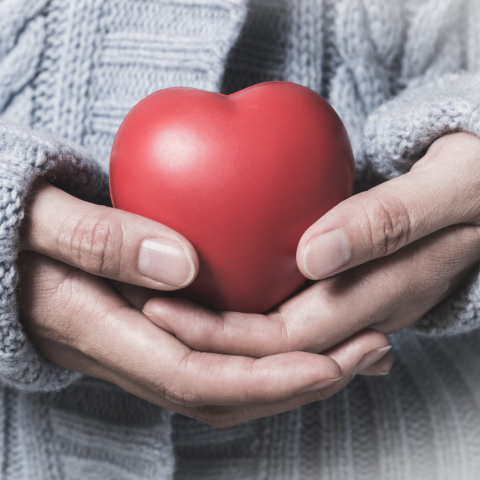
Therapist Offers Five Tips for Coping with Valentine’s Day Blues

Don’t Let This Special Day Get You Down
While Valentine’s Day is a holiday dedicated to romance and love, a lot of people spend the day feeling lonely and depressed.
“Let’s face it, the past couple of years have been tough for those seeking or hoping to maintain romance in their relationships. Between stay-at-home orders, mask mandates and the uncertainty of other’s vaccination and infection status, Cupid’s arrow has missed a lot of people all together,” says Dr. Donya Wallace, a Licensed Professional Counselor and Assistant Professor at Palo Alto University.
Feeling sad or lonely on Valentine's Day is more common than you think, especially if you’ve just ended a relationship, if you’re mourning the loss of a loved one, or feeling alone on that day. “Unfortunately, we cannot always control the events happening around us and this can lead to feelings of disappointment, frustration and sadness,” Dr. Wallace says. “Those emotions can feel especially overwhelming on Valentine’s Day because we have been conditioned since our earliest grade school years to center this day on expressing and receiving love from the people we care about.”
But what happens when life, and COVID, gets in the way?
“Valentine’s Day can feel like a constant reminder of life’s uncertainties and disappointments which some will internalize as personal failures," Dr. Wallace says. The best way to fend off the blues on Valentine’s Day is to dismantle unrealistic expectations that we may have about the day, ourselves, or other people. If the last few years have taught us anything, it is that the world is in a constant state of change, and that creates opportunity for us to re-prioritize and self-define the meaning of things like holidays and the ways we want to acknowledge them.
Dr. Wallace offers five tips to help you manage the unrealistic expectations that can often trigger feelings of sadness and loneliness on Valentine’s Day.
1. Be Your Own Valentine
“The truest love is self-love”, says Dr. Wallace. Make a plan that includes some self-indulgent activity like treating yourself to a massage, yoga class or manicure. If funds don’t allow for such indulgence, plan a day of low-cost or free activities, like lighting your favorite candle and reading a good book, treating yourself to a relaxing bath, or writing yourself a love letter. Set boundaries on people or platforms like social media that suggest that being alone on Valentine’s Day is a sign of failure. Remember choosing self is an act of love that only you can provide.
2. Give love, get love
Turning uncomfortable emotions into action through service to others is one way of managing unrealistic expectations and offers immediate positive feedback.
“Valentine’s Day is really about feeling connected to others and that does not always have to involve romance,” says Wallace. “Sometimes acts of service are enough to remind us of the importance of our existence in the lives of others.” Making valentines and texting or mailing them to your friends and family to show them you’re thinking of them, helping an elderly neighbor by shoveling their sidewalk or walking their dog or volunteering your time to at a local food pantry are altruistic ways to stay connected that can alleviate those negative emotions.
3. Put things in perspective
Though many of us had hoped that 2022 would signal a fresh beginning, the truth is our recovery from the past two years is still a work in progress. The effects of the pandemic, political and social unrest, personal loss, and the disruption of many of our educational and employment settings has led to a collective experience of grief that many are still experiencing.
“If this Valentine’s Day feels tougher than in years past, then it probably is and with just cause.” says Wallace who suggests offering oneself grace and compassion. “Consider how you would support a close friend or family member who is struggling through this day and turn that on yourself. Honor your emotions, whatever they are and embrace then as your truth.” Remember that Valentine’s Day is just that – a day – and it only holds as much significance as you choose to give it.
4. Plan a group date-night
Who says you have to spend Valentine’s Day alone if we are single? Why not plan a group date-night?
“There is this misconception that Valentine’s Day is exclusively for lovers, says Wallace, “and this false belief can lead some folks to spend the evening cooped up in isolation.” Instead, call up some friends, meet at your favorite restaurant and toast the night away with good food, great company and lots of laughs and conversation. Don’t have the funds or mandates threatening to dampen your social outing? Host a cozy drop-in in your home and ask guest to bring their favorite party snack or beverage. Plan to exchange valentines or even more fun, set up a crafting station where guest can make their own to share during the evening.
5. Monitor Your Feelings
No matter how you prepare to avoid the blues, understand that it can happen—and it’s common around Valentine’s Day. Monitor the difference between just feeling lonely around the holiday and symptoms that last for more than two weeks. If feelings of sadness and loneliness persist you may want to see a therapist. Symptoms of depression include thoughts of guilt and hopelessness, loss of interest in once-enjoyable activities, feeling sad, anxious, or tired, changes in sleep or appetite, inability to focus or experiencing suicidal thoughts. If you are having thoughts of self-harm, call 911 or go to the nearest emergency department.
